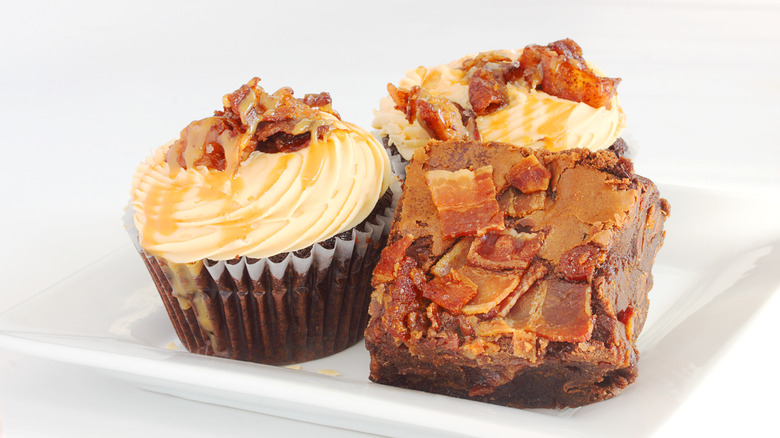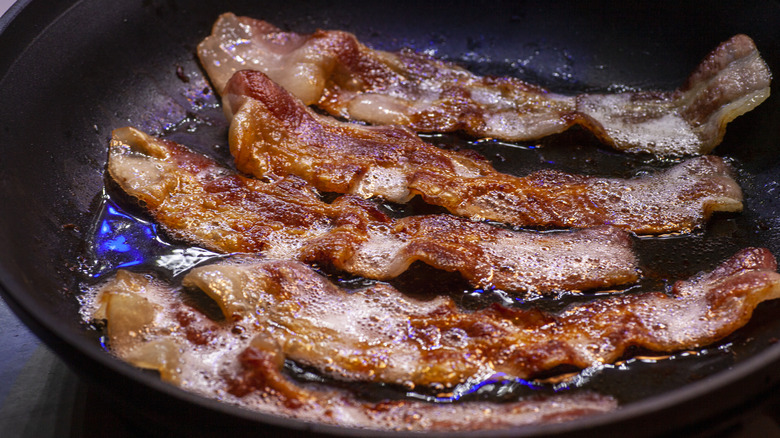The Scientific Reason Bacon Tastes Good With Everything
No matter which way you slice it, bacon is a delicious addition to almost any meal. Bacon is one of the most popular pork products, and it's no wonder as to why. The fatty cut of pork, which is cured and often smoked, packs a wallop of flavor. Bacon is most commonly served as a breakfast side, proving to be an excellent companion to both homemade pancakes and eggs alike. The bacon complements the maple syrup-soaked cakes and adds a punch to fluffy and delicious scrambled eggs with ease. However, its charms extend far beyond the breakfast table. Bacon has made its way into almost every meal — not only in dinners and appetizers, but also in breakfast-themed cocktails as well, and even in desserts like chocolate-covered bacon.
But why is it that bacon seems to taste great with just about everything? Besides the fact that bacon is simply one of the most delicious foods out there, it has several qualities that make it uniquely adaptable for many different meals. Primarily, bacon's saltiness and fat content — as well as its savory, umami flavor — all contribute to its chameleon-like ability to enhance whatever food it is paired with.
Fat, salt, and smoky flavors
If you were to describe the taste of bacon, a few words might come to mind. But high above the more complex descriptors of bacon, which cover its warmth and sometimes almost maple-like flavor, is its saltiness. Bacon packs a punch of salt in every serving that goes far beyond most cuts of meat, thanks to its cured nature. And that saltiness helps to bring out flavors in other foods, as salt is a natural flavor enhancer. But why is this? Well, mainly this is because salt helps to reduce bitter tastes and enhance sweet and umami flavors, which are highly satisfying to most diners.
Beyond salt, bacon has another flavor-enhancing trick up its sleeve, and that's fat. Bacon is a very fat-rich cut of meat, and that fat content — besides producing a fair amount of grease upon cooking — helps to enhance other flavors as well. Fat often helps to carry other flavors and can add depth to dishes that might otherwise be lacking. Then again, there might be something a little more complex behind bacon's deliciousness.
Smokiness is one of bacon's most noticeable and distinct flavors. And its smoky taste can be the secret to bacon's flavor-enhancing abilities. Smoky flavors add a unique level of depth and complexity to many dishes. Bacon's smoky flavor isn't overwhelming, but it's just enough to bring out the depth of other flavors in ingredients such as cheese, vegetables, and even sweets like chocolate or caramel.
A matter of umami
But all of these aspects aside, bacon has yet another trick up its sleeve: umami. As the often misunderstood "fifth taste," umami flavor essentially has a rich, savory, and sometimes meaty taste. According to the National Library of Medicine, foods rich in umami contain glutamates, the amino acid responsible for the fifth taste. And bacon is replete with umami flavor. This umami aspect of bacon helps to deepen the taste of whatever it is added to, providing more complexity and savory deliciousness.
Umami can add a surprising but satisfying twist to foods. This is particularly true of dishes that might be lacking a natural umami taste, such as desserts and candy. The umami flavors of bacon — combined with its smoky taste and salty, fatty makeup — can be the perfect grounding element for caramels or rich chocolate. These elements work just as well when added to salad, giving a meaty bite to an otherwise light dish that might just take your salad from side dish to entrée. The fact is that the flavors that make bacon — well, bacon — are also the perfect element to highlight a whole spectrum of other flavors, making the foods taste more true to themselves. And those foods taste even better now that they have bacon.


